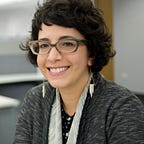Pro-drama or pro-democracy? Use these checklists to ensure your reporting serves people, not politicians
We know how tough it is for people working in newsrooms to carve out time to step back, learn the latest and greatest advice in the field, and then apply it to their work. That’s why we’ve made these handy checklists for reporting on democracy and elections as part of U.S. Democracy Day, a nationwide pro-democracy reporting collaboration.
We’ve been in touch with researchers, academics and practitioners and pulled together some of the best advice for this current polarized context, so you can integrate it immediately.
You can download and print out these handy lists below! If you have any questions, or are finding them helpful — we’d love to hear from you. Send an email to info@usdemocracyday.org.
Reporter’s checklist
We know that no journalist is looking to exacerbate the problems of society with their reporting. But more research is showing that some reporting styles can further polarization, increase news avoidance and fan the flames of audiences.
We’ve created this checklist to help you take a moment before publishing or broadcasting to ensure you don’t unintentionally add to the problems that our democracy is facing. These questions are designed to prompt deeper conversations with sources and levels of understanding that go beyond the binary of horse race coverage.
Special thanks to Amanda Ripley and her book: High Conflict: How we get trapped and how we get out.
Editor’s checklist
Editors have a tough job: not only ensuring the accuracy of stories and making them clear and accessible, but also asking what the impact of a story might be for various audiences, and how to frame it in a useful way.
Like our reporting checklist, the editor’s checklist draws from research and inspiration from practitioners in the field who are finding new ways to create useful, relevant content for news consumers.
These questions can be used at any stage of the editing process — from vetting pitches to line edits — but they’re most useful earlier on to help frame stories.
Read more from U.S. Democracy Day:
🗳️ Contact the Democracy Day organizing team!
Email info@usdemocracyday.org, sign up via Airtable here, or check out the Democracy Day project page to learn more about what pro-democracy reporting looks like in practice.
Jennifer Brandel is an award-winning journalist, founder and organizer whose work spans journalism, civic engagement, democracy, and entrepreneurship. She founded Hearken in 2015, which helps institutions better listen and respond to their stakeholders. She is also a founding member of the organizing committee for U.S. Democracy Day. She can be reached on Twitter at @JenniferBrandel.
About the Center for Cooperative Media: The Center is a primarily grant-funded program of the School of Communication and Media at Montclair State University. Its mission is to grow and strengthen local journalism, and in doing so serve New Jersey residents. The Center is supported with operational and project funding from Montclair State University, the Geraldine R. Dodge Foundation, Democracy Fund, NJ Civic Information Consortium, Rita Allen Foundation, Inasmuch Foundation and the Independence Public Media Foundation. For more information, visit centerforcooperativemedia.org.
